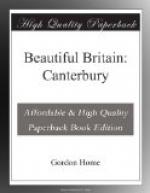So great was the popular execration of the murder that the autocratic Archbishop who had not inspired universal admiration in his lifetime was soon to become the most frequently invoked of all the calendar of saints, and the King himself, finding that his submission to the Papal legate at Avranches, two years after the crime, was not sufficient to avert the wrath of Heaven, which seemed to be visiting him in the form of rebellions and disasters in every part of his dominions, came to Canterbury in 1174 and went through a penance of extreme severity. Landing at Southampton, he came by the Pilgrims’ Way to Harbledown, and so entered the ancient city. At the church of St. Dunstan, outside the walls, he took off his ordinary dress and walked barefoot through the streets to the monastery of Christ Church. It was a wet day, but being in the month of July the wearing of a shirt only with a cloak to keep off the rain could not have been the cause of very great physical discomfort apart from the cutting of his feet by stones on the road. At the Cathedral they took Henry to the tomb of the man whose death he had caused, and there he knelt and shed bitter tears, groaning and lamenting. After again regretting his rash words in an address read by Gilbert Foliot, Bishop of London, and promising to restore the rights and property of the Church, the King, kneeling at the tomb, wearing a hair-shirt with a woollen one above it, placed his head and shoulders in one of the openings in the tomb and there received five strokes with a monastic rod from each of the bishops and abbots present, and afterwards the eighty monks each administered three strokes. Henry was now quite absolved, but he remained for the whole night with his bare feet still muddy and in the same penitential garb.
[Illustration: The scene of the
martyrdom in the north-west
transept
of
the cathedral.
Since the tragic death of Becket in 1170 practically
everything in this portion of the Cathedral has been
re-constructed.]
Arriving in London, the King took to his bed, suffering from a dangerous fever, but a few days later, hearing from Richmond in Yorkshire that the Scots had been defeated and driven north, he recovered rapidly, believing implicitly, after the manner of his age, that this success was attributable to the penance he had undergone on the day before the battle.
And so, through the savage murder of an archbishop and the severe penance of a king the archiepiscopal capital of England began to resound all over Europe, and the annual procession of pilgrims commenced to traverse the hills along the old road from Winchester to the little Norman city. Not by that way only did the vast crowds reach Canterbury, for there was scarcely a road that at some period of the year did not send its contribution to the throng which jostled through the gates into the narrow streets leading to the monastery gateway. Year after year wealth poured into the Cathedral coffers, and pilgrims went away lighter in spirits and in purse, but each carrying with them the little leaden bottle in which the infinitely diluted blood of the martyr mixed with water was distributed.




